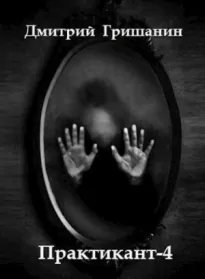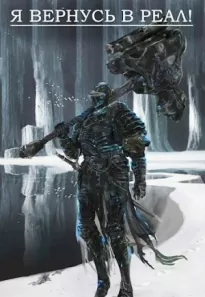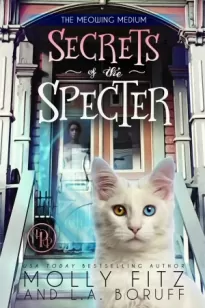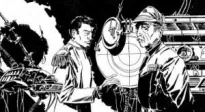Five Passengers from Lisbon
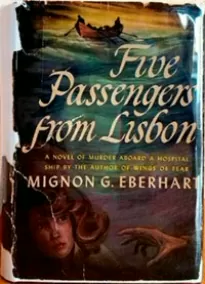
- Автор: Mignon Eberhart
- Жанр: Детективы
Читать книгу "Five Passengers from Lisbon" полностью
12
Danger? Marcia thought again, incredulously, Murder? Why should a man by the name of Jacob Heinzer wish to murder her? Why should any of the
The Colonel said slowly: "So she would report it. So that a man in a red bathrobe and bandages would be suspected, you mean, Colonel Morgan, instead of the real murderer."
Josh nodded. The Captain said shortly: "We'd better put Jacob Heinzer under guard too, Colonel. And now then . . ."
There was a knock at the door, and he said impatiently: "Come in, come in."
It was Luther, his faded eyes anxious. "Somebody said you wanted to see me, Captain."
"Close the door. Now then, one of the
"Yes, I know." Luther glanced at Marcia and smoothed his scant hair nervously. "It must have happened about the time we were talking. Do you know who did it, Captain?"
"That," said the Captain bluntly, "is why I sent for you. You were on deck about that time. Did you see Para?"
"Either alive or dead?" An obscure twinkle came into Luther's faded eyes for an instant and vanished. "No," he said soberly. "After I spoke to Miss Colfax, I walked on around the deck and then inside the ship. I was lounging around the lobby of the upper deck—the deck which I suppose you call the boat deck; at any rate, where the life rafts and lifeboats are mainly located—when I heard of the murder." He hesitated and then lifted his stooped yet somehow elegant shoulders in a brief shrug. "I have no alibi, Captain, if that is what you want."
"It would help," said Captain Svendsen dourly. "I'll have to have statements from each of you." And again there was a knock on the door. This time, however, it was Major Williams, followed by three other officers.
The Captain with Colonel Wells' assistance, gave them quick directions. The
Marcia turned to speak to Mickey, but Josh Morgan stood beside her instead. Mickey, though, met her look and smiled.
Ordinarily, Mickey's almost classically proportioned features wore not so much a somber expression as one of immobility; so the sudden warmth of his smile and the light it gave his clear gray eyes were like a flash of sunlight through a flat, gray sky. How many times in the past had she remembered that smile and clung to the memory as if it had been a lifeline thrown to her through the storm! Even then it was warm and candid and reassuring. Gili's claims were—must be—as fantastic as they sounded. And the fact of murder could not really catch Mickey and herself in its suffocating web.
She told herself that defiantly, but there was no chance to talk to Mickey. There was no chance to talk to anybody, for the group around the Captain suddenly broke apart. An officer went to Mickey and Luther and all three moved toward the door. The Captain went quickly away too, adjusting his oilskins with impatient, angry-looking red hands. Josh Morgan started to speak to her, but a young lieutenant intervened curtly: "Will you come with me, Miss Colfax?"
So she went along the narrow gray passageways again, with the motion of the ship pressing up against her feet, and the lieutenant at her elbow. They went along the stairway, and at the lobby around what had been the purser's desk, knots of nurses turned pretty, young faces and perky little caps to give them curious, suddenly silent, glances.
They reached the cabin on B deck and already a seaman, with a revolver strapped on a belt around his waist, stood in the passageway. "I've searched the cabin, sir," he said quickly to the lieutenant. "I did not find any sort of knife. No gauze, either. But there are three red bathrobes . . ."
"Thank you. I'll report it."
The young lieutenant opened the door, motioned her to enter and closed the door firmly behind her. Daisy Belle Cates was already in the cabin, pacing up and down its narrow length, smoking nervously, pausing abruptly with a sharp look of question on her long, fine face.
"Marcia!" She came quickly and put her brown hand with its broken fingernails on Marcia's shoulder. Her voice was sharp and thin as a knife. "Is it true? Did you find him? They made me come here. I was in the nurses' lounge and they sent a seaman to find me. He searched the cabin." She caught her breath. "Who did it? Who killed him? What did you see?"
Daisy Belle had courage. Daisy Belle had faced the storm on the
The next moment, though, it was veiled. She had taken Marcia to the bunk, drawn up blankets around her, called the guard and asked for hot coffee, anything hot, and got it very quickly. Marcia, staring at the gray underside of the bunk close above her head and seeing on its clean and shining blankness the face of Manuel Para, told again that short and ugly story, with its even shorter and uglier footnote.
"Was it the patient?" asked Daisy Belle.
"I don't know. I couldn't possibly say."
"Heinzer," said Daisy Belle blankly. "Heinzer—I never knew anybody by that name."
And Gili flounced into the cabin, her eyes glittering and narrow, her face both angry and frightened. She flung herself into a chair with a furious and baffled look at a young officer who had escorted her there and who now settled his blouse around his shoulders with a suggestion of relief and left hurriedly. And then Gili saw the coffee, helped herself largely and hungrily to it, looked at Daisy Belle and at Marcia over the edge of the cup and said unexpectedly: "They said he was murdered. That's two."
Daisy Belle was bringing another cup of coffee to Marcia. She stopped so abruptly that the coffee splashed into the saucer.
"What do you mean? Two?"
Gili eyed her. "Things go in threes. Always," she said it coolly. But when she lowered the cup there was a grayish line around her scarlet mouth. Daisy Belle said violently, "What utter drivel!" And, as coolly as Gili, poured the spilled coffee from the saucer back into the cup. Her hand was shaking, nevertheless.
And Marcia thought queerly, if Gili is frightened—and she looks frightened—then she didn't do it. And Daisy Belle was frightened, too.
The fact was, of course, that suspicion had already added itself to the cabin, as inevitably and almost as horribly as murder had added itself to the lifeboat. "There's a dreadful contagion about murder," Josh Morgan had said. "Perhaps it's fear, perhaps it's something else."
So began actually a period of waiting which held Marcia and Daisy Belle—and Gili, perhaps, too, although Marcia never knew what Gili was thinking and planning behind those slanting, green eyes—in a kind of spell of inactivity. They could only wait. Wait and listen for any hint as to the investigation which was going on in the rest of the ship.
The rest of that day passed like that, except that Daisy Belle, first, and then Gili were questioned by the Captain.
He came with Major Williams to their cabin in order to do so; and he was unexpectedly, indeed brutally, frank. He had questioned the others who were on the
"What do you wish to know?"
He told her bluntly. "Anything you know about the murder of Para. Or Castiogne."
"But I've already told you I know nothing about Castiogne . . ." began Daisy Belle, but he cut in.
"Tell me, please, exactly what you did today. Where you were, who talked to you, everything."
"I see," said Daisy Belle after a moment. "We are all suspect. Very well. I'll try to remember." She lighted a cigarette deliberately, put back her head with its thin, reddish-gray curls and faced him coolly. She had had breakfast early. She had gone on deck for a cigarette or two, found it cold and dismal, drifted back through the ship and eventually to the nurses' lounge where she had found some magazines and read. She had gone to lunch, had looked for Marcia there and didn't find her.
Neither the Captain nor Daisy Belle glanced at Marcia, yet somehow, irresistibly she had to explain. "I was on deck," she said. "I'd had breakfast late. I did not go to lunch."
Daisy Belle took a breath of smoke and went on. She had returned immediately to the lounge and read again until a young officer came to find her. He told her of the murder and the Captain's orders for her to return to the cabin. She paused again, imperceptibly, and then added: "Any number of nurses were in and out during the time. Some one of them must have seen me. Some of them must remember seeing me."
Gili's green eyes flashed. She cried: "Oh, you are afraid! That is a—what do you call it . . . ? It is legal. A legal word . . ."
Daisy Belle gave Gili a fraction of a glance and said coolly: "Never mind. You know what it means, all right," and put out her cigarette.
The Captain's blond head jerked around toward Gili. "What about you? What's your story?"
Mickey and Luther, more sophisticated, treated Gili as if she might have been a duchess. To the Captain, black was black and white was white. There were no shades between, and simply and cruelly his manner put Gili on the black side. Unexpectedly, and somehow rather pathetically, she accepted it and replied with unaccustomed meekness: "I didn't do anything, really, all day. I went on deck and walked and then I had breakfast. A nurse took me down to the salon. And then I —oh, I went around over the ship, looking at things, talking to"—she lifted one shoulder m a ghost of a shrug—"talking to this one or that one. Nothing much. They all seemed very"—a shade of discomfiture crossed her face—"very busy," said Gili, somewhat regretfully. '"So many handsome men, too."
Daisy Belle's mouth twitched. The Captain said: "Continue, please. Where were you when the murder occurred?"
"I don't know when that was. I know nothing. . . ."
"When you heard of it then?"
"Oh, well. That." Gili glanced at Marcia. "I had met you on the deck. You remember?"
"I remember," said Marcia.
Gili went on rather hurriedly: "And then—you remember —the handsome officer, the Colonel, came. And I—oh, I thought you might wish to be together, you and he. So I—I went into the ship. And in a few minutes I . . ." she hesitated. Her eyes slid to Marcia and then away. She caught her lower lip in her teeth for a second and suddenly said: "I met Andre and we went on deck, that is, on the other side, the— the left . . ."
"Port," said the Captain automatically. And Marcia thought swiftly, so Gili went straight to Mickey after making the claims she had made.
"We were there smoking and talking for—oh, it must have been for an hour or longer. A long time. Then, well . . ." she shrugged. "People were running. We heard about the murder."
Daisy Belle said dryly: "The word is alibi, Gili. I felt sure you understood it."
Major Williams said: "That agrees with Andre Messac's statement, sir."
"I know." The Captain turned to Marcia. "Does that square with your opinion about the length of time that passed while you were on deck and after you spoke to Miss Duvrey?"
"Yes. That is, I wasn't thinking of time. It seems about right."
The Captain looked at Gili again. "You were on B deck?"
Gili bit her lip. "Yes, but we knew nothing of the murder. Nothing. It is a big ship. How could we know anything of what happened on the other side of it?"
The Captain for a moment looked rather hopeless, as if, in spite of himself, he agreed. And certainly owing to the fact that the exact time when Para was murdered was not known, owing to the layout of the ship and the accessibility of the deck to any portion of it, any attempt to rule out any of the
He paused briefly. Marcia thought, then Mickey was with Gili, for his statement obviously had agreed with Gili's. What had they talked of, there in the fog, for an hour or more?
The Captain went on: "Since it is not likely that two murderers are on this ship I have to conclude that the person who tried to kill you, Miss Colfax, and who attacked Monsieur Messac a few minutes earlier that same night, is the person who succeeded in killing Castiogne and, today, Para. So far I can find no motive linking you together. If you know of anything of the kind you'd better tell me now." He looked at her sharply and must have seen in her face a complete denial, for he did not even pause. "If any of you knows of any suspicious circumstance, or anything at all which is an inaccuracy, a discrepancy as you see it, any time or anywhere, it is your duty to tell me. Now." He paused then. So long, indeed, that the waiting silence in the little cabin seemed freighted with things untold.
Yet there was nothing more that Marcia could tell him, except, of course, Mickey's real name and identity, and that had nothing to do with two murders, or with the attack upon Mickey and herself. She looked at Daisy Belle, whose fine-drawn face was lifted frankly and openly, but who also did not speak. She looked at Gili, who was equally still, but whose look suddenly to Marcia seemed secretive and listening. It was so strong an impression that she thought swiftly, why is she listening; what does she expect me or Daisy Belle to say? And then she knew.
Gili had accused Daisy Belle and Luther Cates of being Nazis. To Marcia, at least, it was an impossible story to accept. She thought that Mickey and Josh Morgan found it equally difficult to credit. Certainly all three of them had tried to persuade Gili to tell no one else; certainly, so far Gili had let herself be persuaded.
But suddenly that very acquiescence seemed, somehow, wrong. It was not like Gili. It did not fit what Marcia knew of her. It was as if something in a familiar picture had swung suddenly awry. And that thought brought her to another. Some time, not long ago (just before she'd walked down the stairs, wasn't it, and found Para?), something else had suddenly and obscurely seemed wrong. For a moment there had been that same curious and troubling sensation of something, some very small thing that was askew, that was again wrong. Whatever it was, it had eluded her. She could not pin it down and identify it.
She could, however, with Gili now. It would have fitted the picture of Gili if, under pressure of the investigation into murder, she had blurted out her accusation of the Cateses again. She did not do it and that was wrong. It was not so easy, though, to understand why.
The pause had lengthened. Captain Svendsen's bleached eyebrows were drawn heavily together. Major Williams was fidgeting nervously. Still no one spoke. Suddenly the Captain opened his straight-lipped mouth, closed it again with a snap, whirled around and walked out of the cabin without another word. Major Williams gave them a worried glance, mumbled something and disappeared behind the Captain. The door closed.
Daisy Belle reached for a cigarette. Gili stared at the floor. Marcia sat down slowly. She must be cool and calm, like Daisy Belle. But Daisy Belle hadn't seen what she had seen there in the fog under the stairs.
Well, she wouldn't think of that.
She wouldn't think of Gili.
But she must find a way to see Mickey.
After a long time Marcia decided also that she would not think of Josh Morgan and the way he had held her while she sat in the deck chair, in the fog, before he left her alone, and suddenly, unexpectedly, kissed her. So, for a queer short space in time, everything but his nearness, his mouth upon her own, was blotted out. She got up restlessly, walked to the port, stared into the fog, came back.
Daisy Belle put out one cigarette and lighted another. Gili went to the mirror, combed out her hair, went to sprawl on her stomach in her bunk, her long hair over her face.
Dinner came eventually on trays, passed in to them by the seaman then on guard.
Gili, tossing back her long locks of hair questioned him. "Is there any news? What are they doing? Have they found who murdered him?"
But he mumbled something and went away. They heard the click of the lock and after that no one came near them. Lights were on in the cabin by that time and the ports were dark gray.
Night came early, due to the fog. There were eventually no sounds at all from the rest of the ship. They felt isolated and alone, as if they were traveling toward an unknown destiny in a ghost ship. It was curious, thought Marcia once, to realize that all around them the busy life of the hospital ship went on. In the cabin there was only the faraway throb of the ship's engines and the feeling of motion and the occasional distant sound of the ship's bell. And the three women, shut up together, each thinking her own thoughts.
Eventually, too, speaking only at intervals and then saying nothing, they got into the three narrow bunks. Daisy Belle turned out the light and there was only the soft shaft of faintly crimson light coming from the port opposite the door. Probably none of them slept. Certainly for Marcia the darkness, the occasional wail of the foghorn, the lap and rush of water outside all merely served to heighten and sharpen the questions that seemed to fill the cabin as if they had substance.
If Castiogne had been murdered in the lifeboat, who among them had done it and why? Why then was Para murdered? Was the figure in the red bathrobe with the bandaged, eyeless face that of Jacob Heinzer, the patient—and if so, why did he deny it? And if it was not, then who had assumed that disguise, and again, why?
Josh had answered that; but if Marcia were actually in danger (and those hands on her throat had been real; there was no question of that), what possible link was there between her and two Portuguese seamen v.hom she scarcely knew by name?
Again she could not extricate herself from endless circles of conjecture, which went around and around on themselves and arrived nowhere. Mickey and herself, Daisy Belle and Luther Cates, Gili, and the other seaman, Urdiola. Suddenly, in the night, her eyes wide open, staring at that soft band of crimson striking into the cabin from the port, it seemed to her that no one perhaps had paid enough attention to Urdiola, the small, swarthy seaman with the shifting dark eyes and the wizened monkeylike face. Certainly he must have known more of Para and of Castiogne than anyone else.


